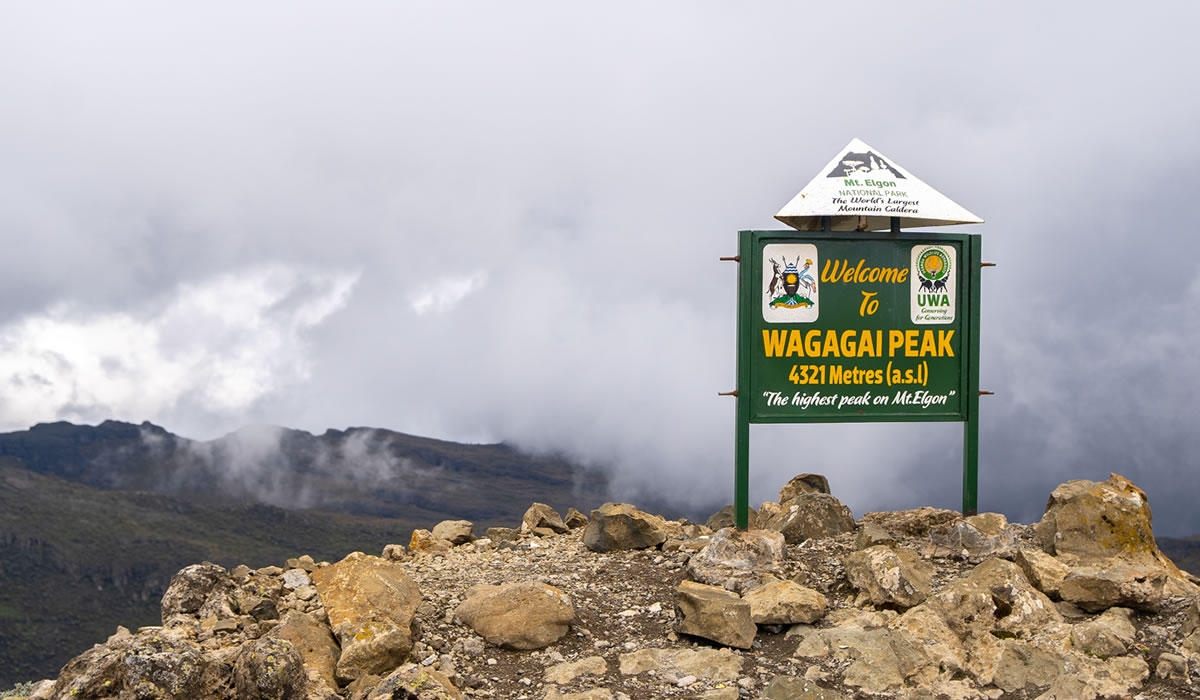Mount Elgon National Park, located in eastern Uganda along the border with Kenya, is one of the country’s most majestic and ecologically diverse protected areas. Covering an area of approximately 1,279 square kilometers, the park is centered around Mount Elgon, an extinct shield volcano and one of the largest volcanic mountains in the world. The park is renowned for its ancient caves, dramatic cliffs, lush forests, scenic waterfalls, and diverse wildlife, making it a must-visit destination for hikers, birdwatchers, nature lovers, and adventure travelers.

Scenic Landscapes and Volcanic Features
Mount Elgon National Park is dominated by Mount Elgon, which rises to 4,321 meters at Wagagai Peak, the highest point in Uganda. The mountain’s enormous volcanic base, gentle slopes, and massive caldera distinguish it from the steep peaks of neighboring ranges. The park’s landscape includes montane forests, bamboo zones, grasslands, river valleys, cliffs, and gorges. The park is also famous for its “gorges” such as the Sasa, Suam, and Kitum gorges, which are deeply incised valleys created over millennia by erosion and volcanic activity.
One of the most remarkable features of Mount Elgon National Park is the Kitum Cave, a large volcanic cave that extends deep into the mountain. The cave is renowned for its salt deposits, which attract elephants and other wildlife. Visitors can explore the cave under the guidance of experienced rangers, observing wildlife tracks, bat colonies, and ancient stalactites and stalagmites. Other scenic features include stunning waterfalls, hot springs, and panoramic views from the mountain slopes, offering spectacular photography and sightseeing opportunities.
Wildlife in Mount Elgon National Park
Mount Elgon National Park is home to a wide range of wildlife adapted to both montane and lower forest ecosystems. Mammals found in the park include elephants, buffaloes, bushbucks, forest duikers, giant forest hogs, and several primate species such as vervet monkeys, black-and-white colobus monkeys, and olive baboons. Elephants are particularly notable for visiting Kitum Cave to obtain essential minerals, providing a unique wildlife observation opportunity.
Birdlife in Mount Elgon is equally impressive, with over 300 species recorded. The park is a birdwatcher’s paradise, offering sightings of rare and endemic species such as the Rwenzori turaco, Shelley’s crimsonwing, and the white-headed wood hoopoe. The montane forests, bamboo zones, and open grasslands provide habitats for diverse bird species, including sunbirds, hornbills, francolins, and raptors. Early mornings are ideal for birdwatching, as the park’s avian residents are most active during these hours.
Reptiles and amphibians also inhabit the park, including chameleons, snakes, and frogs, contributing to the park’s rich biodiversity. Invertebrates such as butterflies, moths, and beetles are abundant, particularly in forested and riverine areas, providing additional ecological interest for visitors and researchers.
Activities in Mount Elgon National Park
Mount Elgon National Park offers a range of activities for adventure seekers, wildlife enthusiasts, and nature lovers.
Hiking and Mountain Climbing
Hiking to Wagagai Peak and exploring Mount Elgon’s slopes is the park’s primary attraction. Several trekking routes of varying difficulty allow visitors to experience the mountain’s diverse landscapes, including bamboo forests, montane forests, and open grasslands. The Sasa Trail is one of the most popular routes, offering a moderate hike with opportunities to observe wildlife, waterfalls, and scenic vistas. Summit hikes are more challenging and require physical fitness, proper gear, and experienced guides to ensure safety.
Cave Exploration
The park’s volcanic caves, particularly Kitum and Suam Caves, are unique geological features that attract tourists. Visitors can explore these caves with trained guides, learning about their geological formation, wildlife inhabitants, and historical significance. Elephants frequent Kitum Cave to lick the salt deposits, offering a rare opportunity to observe these gentle giants in a dramatic natural setting.
Birdwatching and Wildlife Photography
Mount Elgon National Park is ideal for birdwatching and wildlife photography. Guided birding tours help visitors locate and identify endemic and rare species, while wildlife photographers can capture elephants, buffaloes, primates, and smaller mammals against the park’s scenic backdrops. Sunrise and sunset provide spectacular lighting for photography, highlighting the mountain’s dramatic cliffs and forests.
Nature Walks and Educational Tours
Guided nature walks allow visitors to explore the park at a leisurely pace, learning about medicinal plants, forest ecology, and wildlife behavior. Educational tours are particularly suitable for students, researchers, and eco-tourists interested in understanding the park’s unique montane ecosystem and conservation efforts.
Waterfalls and Scenic Views
The park is dotted with stunning waterfalls, including Sipi Falls, Kapchorwa Falls, and smaller cascades along river valleys. These waterfalls are accessible via hiking trails and provide excellent spots for relaxation, photography, and picnics. The panoramic views from the mountain slopes, particularly near Wagagai Peak, offer breathtaking vistas of the surrounding plains, forests, and neighboring hills.
Cultural Experiences
The park is situated near communities of the Sebei and Bagisu people, who have lived in the Mount Elgon region for generations. Visitors can engage in cultural tours to learn about traditional farming, local crafts, basket weaving, and brewing practices. Cultural tourism supports local communities and provides insight into the deep connection between the people and the mountain environment.
Accommodation in Mount Elgon National Park
Mount Elgon National Park offers accommodation options for different budgets and preferences. Luxury lodges such as Sipi River Lodge and Mount Elgon Lodge provide comfortable rooms, fine dining, and organized tours for trekking, birdwatching, and cave exploration. Mid-range lodges and guesthouses such as Kapchorwa Guest House and Sipi Falls View Lodge offer cozy stays with easy access to the park’s main attractions. Budget travelers can opt for community-run campsites or basic guesthouses near park entry points, providing affordable lodging while supporting local livelihoods.
Many lodges and camps are strategically located near trailheads, waterfalls, and scenic viewpoints, allowing convenient access to hiking, birdwatching, and cultural experiences. Accommodation options often emphasize eco-friendly practices and sustainability, minimizing environmental impact while offering comfortable stays.
Best Time to Visit Mount Elgon National Park
The best time to visit Mount Elgon National Park is during the dry seasons, from December to February and June to September. During these months, trails are more accessible, wildlife is easier to spot, and hiking conditions are safer. The wet seasons, from March to May and October to November, bring lush greenery, flowing waterfalls, and abundant birdlife, creating spectacular scenery but sometimes challenging trekking conditions due to slippery trails.
Year-round, the park offers unique experiences, from observing elephants at Kitum Cave to birdwatching in montane forests. Proper preparation, including rain gear, trekking boots, and suitable clothing, is recommended for all visitors.
Getting to Mount Elgon National Park
Mount Elgon National Park is approximately 320 kilometers east of Kampala. Travelers can access the park by road, typically taking 6 to 8 hours via Mbale town. The park’s main entry points are Sipi, Kapchorwa, and Sironko, which serve as gateways for hiking, trekking, and wildlife tours.
For those combining Mount Elgon with other eastern Uganda attractions, such as Lake Kyoga, Mount Moroto, or Mbale town, the park provides an excellent destination for a multi-day safari or adventure tour.
Conservation and Community Engagement
Mount Elgon National Park is managed by the Uganda Wildlife Authority, which focuses on conserving the mountain’s montane ecosystems, protecting wildlife populations, and promoting sustainable tourism. Conservation initiatives include anti-poaching patrols, forest restoration, community outreach programs, and environmental education campaigns.
Local communities benefit from tourism through employment, guiding, portering, and cultural tourism initiatives. Sustainable tourism ensures that visitors contribute positively to conservation while supporting livelihoods and preserving traditional knowledge and practices. The collaborative approach between park management and local communities has been crucial in maintaining Mount Elgon’s ecological integrity.
Mount Elgon National Park is a treasure of Uganda’s natural heritage, offering diverse landscapes, rich biodiversity, and thrilling adventure opportunities. From hiking to Wagagai Peak, exploring volcanic caves, observing elephants and primates, to birdwatching and enjoying scenic waterfalls, the park provides a wide range of experiences for travelers of all interests.
Its combination of montane forests, bamboo zones, grasslands, cliffs, and volcanic features creates a stunning natural playground for outdoor enthusiasts, photographers, and nature lovers. By visiting Mount Elgon National Park, travelers not only enjoy unforgettable experiences but also support conservation and community development, ensuring the preservation of this extraordinary mountain ecosystem for future generations.

